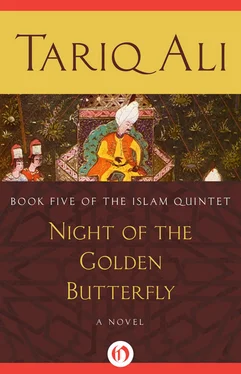‘The textiles were beautiful, but designed only for the nobility. They were made of pure silk. The pottery was simple. He had discovered that our potters were making thousands of plates with the blue that had become so popular in all of the Muslim world. From Yunnan these plates with Arabic calligraphy would be transported to Baghdad and Palermo and, later, to the Ottoman lands of the great Sultan, and from there to Cordoba in al-Andalus and to Africa and even the barbarian world. When trade with the Arabs ceased, your great forebears made sure that the potteries never closed down. Skills handed down from father to son are too precious to lose. Once lost, they never return.
‘Those plates became the pride of every family in Dali, even those who were not Hui. At the Third Month Fair, which was the largest in the world, I think, because traders came from every province in China, but there were also Lamas from Tibet and tribal peoples and others from Siam and Bengal-India and Burma and Cochin China. They used to say that in the very early years of the fair there were traders from as far away as Mesopotamia in the world of the Arab peoples, and that it took them six months to make the journey, so they were all a year older when they returned to Basra.
‘My grandfather, Wénxiù’s father, always used to throw a big banquet for the most important visitors, whose families had been trading with ours for many generations. Dù Wénxiù had always thought that he would continue in the trade of his father and forebears. My grandfather said that our ancestors had first come here with the armies of Qubilai Khan. It was said in our family that our great forebear, who finally settled in Dali and built the house where we all lived afterwards, had been responsible for supplying the Great Khan’s armies with food and women. I have no idea whether that is a fact or not. I hope it was just food he supplied. So we had been in the city for many centuries.
‘Some Hui, especially those who live in Khanfu [Canton] and Beijing, would never be happy tracing their lineage to the time of the Great Khan. They insist they are the direct descendants of the Arab traders and ambassadors who came to these shores while the Prophet, honour his name, was still alive. The Prophet had once said, “Seek knowledge where you find it, even as far as China,” and the Hui in Khanfu claim that is why their ancestors arrived in the first place: to seek knowledge, not profit. People are so ridiculous sometimes. Sultan Suleiman used to smile and say that every Believer wants to believe that he has a tiny drop of Arab blood in him, because he wants to be blessed with the same blood as the Prophet.
‘However we came, we intermarried so much that were it not for the taboo on pork and circumcision we would be no different from the Han. But we would never be the same as the Manchu. [At this point, D, she would pause, not to regain her breath, but to offer a short prayer to Allah asking him to punish the Manchu for their crimes. Hanif would always interrupt, ‘Mao Zedong is not a Manchu, Elder Granny,’ but she would brush him aside with a gesture. Then she would continue.]
‘Dù Wénxiù was happy helping my father organize our trading activities. He would have done that for the rest of his life and remained happy, but Fate had other plans for him.
‘I think it was springtime in 1856, when the worst killings of our people took place in Kunming. The Manchu governor hated the Hui people in any case, but prices fell and the newly settled Han became resentful of those who could still work. The Manchu governor, Shuxing’a, hated us Hui because when he had been in the northwest he had been defeated by some Muslim rebels. They were not Hui. They spoke their own language and had their own customs, but of course they shared our faith and prayed as we do, facing west, and, naturally, they never ate pork. Shuxing’a’s soldiers had been defeated by them and he was running away disguised as a woman. The rebels captured him. Let’s see if you are a woman, they said, and then they stripped him and threw pebbles at his testicles. He hated them forever after that and suffered from pebble-sickness for the rest of his life. He did not think how lucky he was to be alive. Then he was sent by the Manchu to Yunnan, and once in Kunming he began to plot his revenge, but against us Hui. He thought we were all the same as the people in the northwest. It was he who organized the massacre in Kunming. And once these things start there’s no knowing how they will end. Even before he came, the Han were killing us in the villages, burning our homes and mosques. By the time this monster started in Kunming, we had lost nearly forty thousand men, women and children. So our young men took up arms to defend themselves. What else could they do?
‘Wénxiù suddenly adopted an Arab name, Suleiman, to stress his faith, to unite our people and defy the Manchu. They killed so many of us that year. Thousands and thousands perished. It made our young men very angry. We are not goats to be led to slaughter so easily, Wénxiù told his father, and he and other young men went into the mountains to teach themselves how to fight.
‘My father was a Han, but he fought on our side because he wanted Yunnan to be free of the Manchu. All we Yunnanese are very proud people. The Manchu called us bandits, but they were the real bandits. Do you know what bandits are, Hanif Ma?’
‘I like bandits, Elder Granny. I want to be a bandit.’
Her cackle was infectious and made everyone laugh, including Father.
‘There are good bandits and evil bandits, little Hanif Ma. Good bandits help the poor. Evil bandits work for the Han rulers, never the poor. Wénxiù was only nineteen years old, but my mother told me that he never lost his temper, not even when he was a little boy. So after they went to the mountains and changed their names, all his friends would call him Suleiman Dù Wénxiù, till he became the Sultan. Did you know that, little Jindié and Hanif? Your ancestor was the Sultan of Yunnan. I may have been only eight years old, but I can still remember when all the people came out on the streets of Dali to greet him: “Sultan Suleiman wan sui, Sultan Suleiman wan sui .” It was the first slogan I ever learned. When we went with my mother to see him in his small palace, she made us repeat the slogan. He lifted me up and kissed my cheeks. His beard was very soft, very different from the beards in Xinjiang.
‘There were many different people of every sort who lived in Yunnan during his time. Han, Hui and non-Han, many of whom were tribal people and others who were Buddhist. Suleiman Dù Wénxiù fought the Manchu armies and defeated them, but he never permitted any discrimination against the Han people in Yunnan. There was so much intermarriage. My mother, Wénxiù’s favourite younger sister, was married to a Han Yunnanese, who was my father. It was like that all over our country. We were all interrelated, and if the Manchu had not interfered with us and sent in more and more of their people to steal our work, our mines, our trade and our property, and this at a time when things were bad for everyone, there would have been no rebellion.
‘And it was all the people, not just the Hui, who fought against the Manchu. Had it only been us, we would have been defeated much, much sooner. Always remember this, children. Your great ancestor was a Muslim, a Hui, but he ruled for all the people. Not just the Hui. That made my father so happy, because after the killings in Kunming and the villages everybody expected the Hui to go in for revenge killings. Sultan Suleiman knew that well and it made him angry. “We are not such poor-spirited people that we seek revenge on innocents. The best revenge is to make the whole of Yunnan strong and free from the rule of the Manchu, who steal, oppress and kill all Yunnanese who refuse to wear the queue.” The day after he said that, many of the Han who had lived in Yunnan for many generations came out and publicly had their queues removed. That was the way they showed their support for your great ancestor. You must always be proud of him and respect his memory. Are you listening, Hanif Ma and little Jindié?’
Читать дальше












